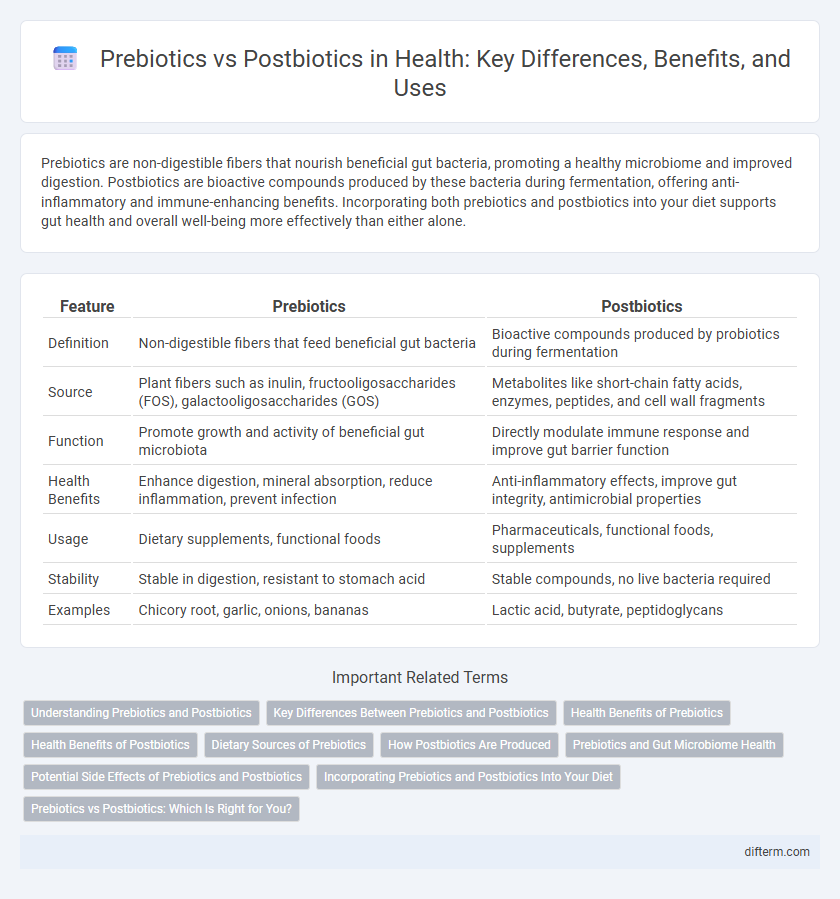Prebiotics are non-digestible fibers that nourish beneficial gut bacteria, promoting a healthy microbiome and improved digestion. Postbiotics are bioactive compounds produced by these bacteria during fermentation, offering anti-inflammatory and immune-enhancing benefits. Incorporating both prebiotics and postbiotics into your diet supports gut health and overall well-being more effectively than either alone.
Table of Comparison
| Feature | Prebiotics | Postbiotics |
|---|---|---|
| Definition | Non-digestible fibers that feed beneficial gut bacteria | Bioactive compounds produced by probiotics during fermentation |
| Source | Plant fibers such as inulin, fructooligosaccharides (FOS), galactooligosaccharides (GOS) | Metabolites like short-chain fatty acids, enzymes, peptides, and cell wall fragments |
| Function | Promote growth and activity of beneficial gut microbiota | Directly modulate immune response and improve gut barrier function |
| Health Benefits | Enhance digestion, mineral absorption, reduce inflammation, prevent infection | Anti-inflammatory effects, improve gut integrity, antimicrobial properties |
| Usage | Dietary supplements, functional foods | Pharmaceuticals, functional foods, supplements |
| Stability | Stable in digestion, resistant to stomach acid | Stable compounds, no live bacteria required |
| Examples | Chicory root, garlic, onions, bananas | Lactic acid, butyrate, peptidoglycans |
Understanding Prebiotics and Postbiotics
Prebiotics are non-digestible fibers that nourish beneficial gut bacteria, enhancing digestive health and immune function. Postbiotics refer to bioactive compounds produced by probiotic bacteria during fermentation, delivering anti-inflammatory and antimicrobial benefits directly to the host. Understanding the distinct roles of prebiotics and postbiotics is essential for optimizing gut microbiota balance and promoting overall health.
Key Differences Between Prebiotics and Postbiotics
Prebiotics are non-digestible fibers that feed beneficial gut bacteria, promoting a healthy microbiome, while postbiotics are bioactive compounds produced by these bacteria during fermentation. Prebiotics serve as substrates to enhance microbial growth, whereas postbiotics directly contribute to immune modulation, anti-inflammatory effects, and gut barrier function. Understanding the distinct roles highlights prebiotics' function in microbiome nourishment and postbiotics' impact in delivering therapeutic health benefits.
Health Benefits of Prebiotics
Prebiotics promote gut health by nourishing beneficial bacteria, enhancing digestion, and boosting immune function. They stimulate the production of short-chain fatty acids, which reduce inflammation and improve metabolic health. Regular intake of prebiotic fibers supports bowel regularity and may reduce the risk of chronic diseases like diabetes and cardiovascular conditions.
Health Benefits of Postbiotics
Postbiotics, bioactive compounds produced during the fermentation process by probiotics, enhance gut health by strengthening the intestinal barrier and reducing inflammation. They promote immune system modulation and improve metabolic functions, contributing to overall wellness. Unlike prebiotics, postbiotics provide direct health benefits without the need for further microbial fermentation.
Dietary Sources of Prebiotics
Dietary sources of prebiotics primarily include fiber-rich foods such as chicory root, garlic, onions, leeks, asparagus, bananas, and whole grains like barley and oats. These foods contain non-digestible fibers like inulin and fructooligosaccharides that stimulate the growth of beneficial gut bacteria. Incorporating a variety of these prebiotic-rich foods supports digestive health and enhances the efficacy of postbiotic compounds produced by microbial fermentation.
How Postbiotics Are Produced
Postbiotics are produced through the fermentation of prebiotics by beneficial gut bacteria, resulting in bioactive compounds such as short-chain fatty acids, enzymes, and peptides. These metabolites support gut health by enhancing the intestinal barrier, modulating the immune response, and reducing inflammation. Unlike prebiotics, which serve as food for probiotics, postbiotics are the actual metabolic byproducts that deliver direct health benefits.
Prebiotics and Gut Microbiome Health
Prebiotics are non-digestible fibers that selectively stimulate the growth and activity of beneficial gut bacteria, enhancing overall gut microbiome health. These compounds serve as essential nutrients for microbiota, promoting the production of short-chain fatty acids that support intestinal barrier function and reduce inflammation. Maintaining a diet rich in prebiotics, such as inulin and fructooligosaccharides, is crucial for optimizing microbial diversity and gut homeostasis.
Potential Side Effects of Prebiotics and Postbiotics
Prebiotics may cause gastrointestinal discomfort such as bloating, gas, and diarrhea, especially when introduced abruptly or consumed in high doses, due to their fermentation process in the gut. Postbiotics, being metabolic byproducts of probiotics, generally exhibit fewer side effects but can still trigger mild digestive issues or allergic reactions in sensitive individuals. Understanding individual tolerance levels and starting with low doses can help mitigate potential adverse effects related to both prebiotic and postbiotic consumption.
Incorporating Prebiotics and Postbiotics Into Your Diet
Incorporating prebiotics and postbiotics into your diet supports gut health by promoting beneficial bacteria growth and enhancing their metabolic benefits. Prebiotics, found in foods like garlic, onions, and bananas, serve as nourishment for probiotics, while postbiotics, such as short-chain fatty acids and bacterial metabolites, deliver anti-inflammatory and immune-modulating effects. Consuming a diverse range of fiber-rich vegetables and fermented foods like yogurt or kimchi ensures a balanced intake of both prebiotics and postbiotics for optimal digestive and overall health.
Prebiotics vs Postbiotics: Which Is Right for You?
Prebiotics are non-digestible fibers that nourish beneficial gut bacteria, promoting a healthy microbiome and improving digestion. Postbiotics consist of the metabolic byproducts produced by these bacteria, which directly support gut barrier function and immune health. Choosing between prebiotics and postbiotics depends on individual digestive health needs, with prebiotics enhancing bacterial growth and postbiotics providing immediate bioactive benefits.
Prebiotics vs postbiotics Infographic

 difterm.com
difterm.com